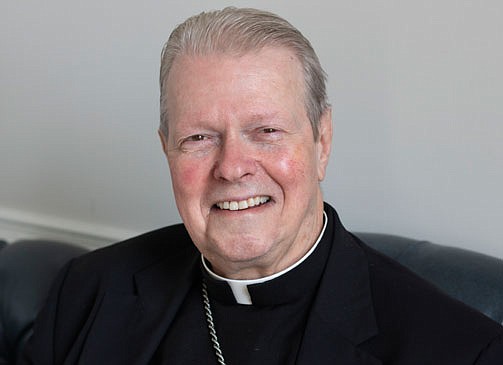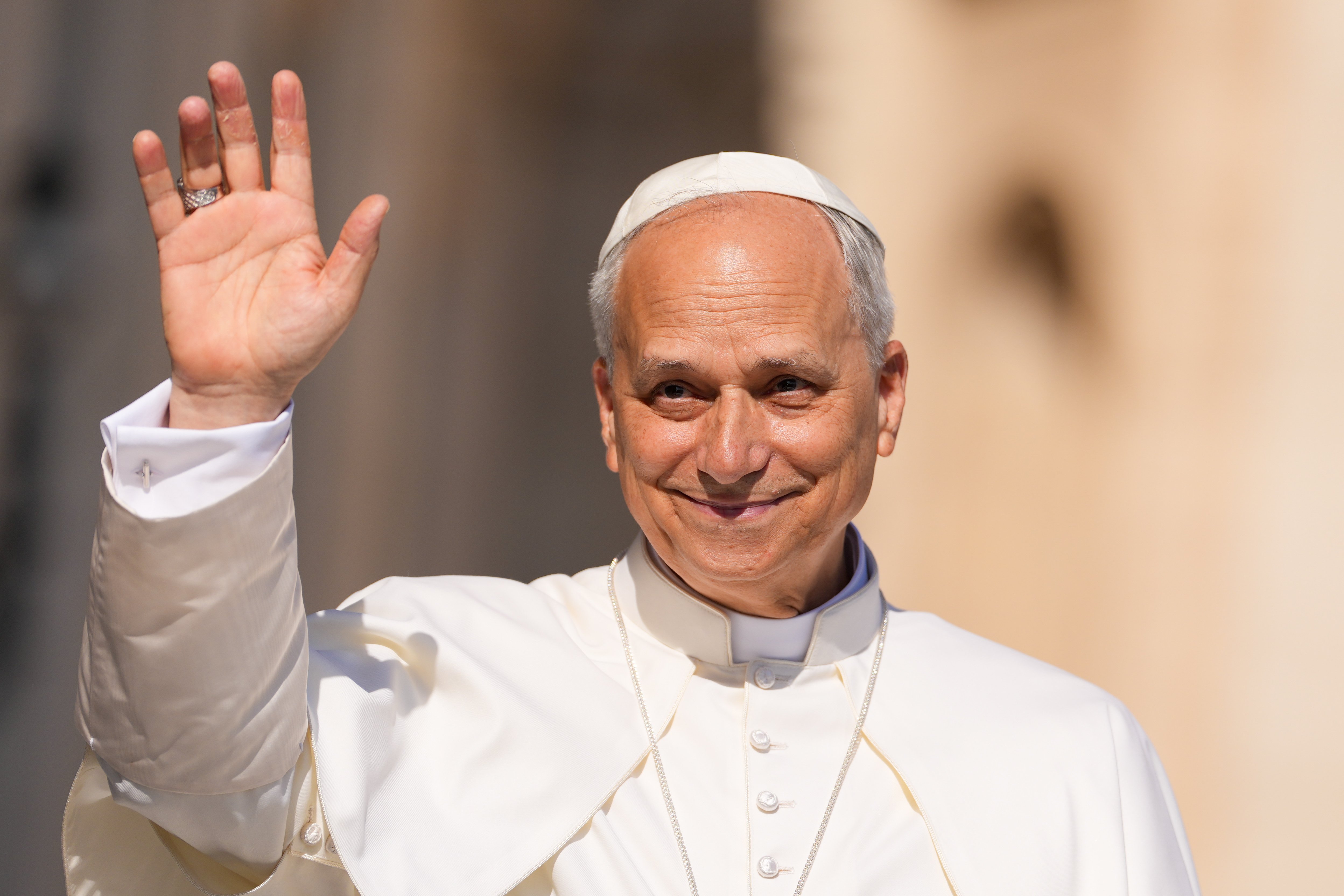April 17, 2024 at 8:53 a.m.
The wounded Body of Christ
One of the most astonishing consequences of the resurrection of Jesus Christ was the commission to his Apostles the evening of the day he rose. Unexpectedly appearing in a room where they were in lockdown for fear of their lives, he says, “Peace be with you” (Jn 20:19). It’s perfectly normal to crawl under a blanket or flee into a corner in the face of terror, be it from a nightmare, a traumatic memory, or to escape some imminent threat of harm. Isn’t it rather bold that Jesus confronts the terror by passing through the last line of defense — the bolted doors — in that little room where a flickering hope of safety lies now that Jesus was gone. But he knows they need his abiding presence, despite their fear it has all been lost, and he wants to offer mercy.
“Peace be with you,” Jesus says twice. A standard greeting, though John seems to echo an earlier passage: “Peace I leave with you; my peace I give to you. Not as the world gives do I give it to you. Do not let your hearts be troubled or afraid” (Jn 14:27). The Apostles respond with joy (Jn 20:20). The words are effective, not just platitudes. What makes them so?
The joy of the Apostles is not instantaneous, just because Jesus is back. For a decisive action occurs between the repeated greetings. John says Jesus “showed them his hands and his side” (Jn. 20:20). Then only can they “rejoice in the Lord.” Whether or not they realize it at once, Jesus not only reveals his wounds — which his glorified body must retain — but their own. It is their brokenness, their sins that induced his wounds, his own passion and death. What happens next is stunning.
Recall these men had deserted Jesus in his hour of suffering. John alone was at the foot of the cross. He too had fallen asleep on Jesus during the agony in the garden of his betrayal (cf. Mt 26:40, Mk 14:37, Lk 22:46). Now Jesus is back. Why? Shouldn’t he be done with them? They had proven false friends, clueless about the meaning of his life and suffering.
Note that Thomas is not present. We do not know why. He is often referred to, pejoratively, as the “doubting” Apostle. How is he any worse than the others? His earlier appearances in John’s Gospel may reveal some skeptical tendencies (cf. Jn 11:16). His practical mind seeks some roadmap to the “place” Jesus says he was going to (cf. Jn 14:5). He also seems to have had serious issues with his confrères, perhaps questioning their loyalties and qualifications for being singled out from other disciples. No doubt Thomas is the aka “Judas, not the Iscariot,” who asks, “Master (then) what happened that you will reveal yourself to us and not to the world?” (Jn 14:22). We soon learn why.
For some yet undisclosed reason, Jesus had chosen to identify himself, his ongoing mission in the world, with this motley band of men called the Apostles, entrusting to them — sinners though they be! — with his healing and forgiving mission in the world. For no sooner does he show them his own wounds and wish them “peace” than he breathes on them with the most shocking, consequential words, “Receive the Holy Spirit. Whose sins you forgive are forgiven them, and whose sins you retain are retained” (Jn 20:22-23). Take note. Jesus does not say, “forgive and forget!” Or there would be no point in his showing up with his wounds so fully visible. The scars remain! Nor does he leave directives which sins should be forgiven, and which retained. Yet his subsequent actions leave a clear message that he wants the Church to accept this healing commission and the Apostles to lead the charge.
No way can this commission be taken as a reward for any good they had done! These men were neither reliable, faithful nor ostensibly even good. Yet Jesus authorizes them to be instruments not only of his peace, but of the hope and healing his peace brings to the whole world including, we have to assume, people they had wounded personally by sins of action or omission. Not only had the Apostles in their own way betrayed Jesus, but even one another and all those who looked to them for example. A lot of healing was left to be done. No wonder Jesus had to bequeath the Church an ongoing ministry of reconciliation.
I think of that momentous day when Jesus not only rose from the dead but founded the ecclesial communion that we call “the Church” as a beacon of hope. I also lament all the wounds and scars that through time and temptation members of this church have either caused or been complicit to by silence or indifference. If nothing else, as a successor of the Apostles, I can and must never cease to say I am hurt and offended by these same sins and I sincerely and readily apologize as I pledge to continue to make amends to all who have been wounded and scarred within and by the Body of Christ, especially survivors of sexual abuse by clergy and other members of that same mystical Body.
Thomas may have been aware of such tension and its patent hypocrisy. It might have irked him that Jesus would appear to the others in his absence, giving them this astounding commission to be healers of wounds they themselves were, at least in part, responsible for, wounds to Jesus himself, and wounds to his mystical Body, the Church. We know the story does not end there. Jesus shows up in the room a week later. This time, it is just for Thomas.
What Jesus does then, in the presence of all eleven, is remarkable and, I hope, encouraging for all who may have been hurt or wounded by the Church. Jesus invites a broken, doubting Thomas literally to enter his own wounds, to dare to “come forth” — his words to Lazarus (Jn 11:43) — and to find healing in his scarred hands and side. How ironic, in some ways incomprehensible, that the Church should also be exposed as wounded, sinful in its members, in need of redemption and healing by the same Jesus Christ. Wounded healers must first confess their own sins, bearing their wounds and scars with humility and patience so as to be instruments of peace that Jesus calls them to be. Not all may be able to accept this hope. Yet what the Lord clearly commands us is to respond to the commission, to rise to the grace to be in the world what we are called to be: his healing presence.
@AlbanyDiocese
MORE NEWS STORIES
- Pope to Ukrainian Greek Catholics: ‘God will have the last word,’ ‘life will conquer death’
- ‘We are in this together’: Recent Supreme Court rulings support parents in their vocation
- Idaho Catholics unite in prayer for firefighters killed in sniper ambush
- Longtime head of Polish Catholic news agency resigns, as bishops seek tighter control
- ‘Revival Worship’ brings the fire of the National Eucharistic Congress into playlists
- US archbishops reflect on importance of fostering unity
- Slain Minnesota lawmaker, husband remembered for lives lived ‘with purpose, meaning’
- ANALYSIS: ‘Big Beautiful Bill’ trillion-dollar increases to US debt to hit poor hardest
- Archbishops must promote unity, seek new ways to share Gospel, pope says
- Experts: Catholic media witness to truth, Gospel and are at ‘kairos moment’ in church











Comments:
You must login to comment.